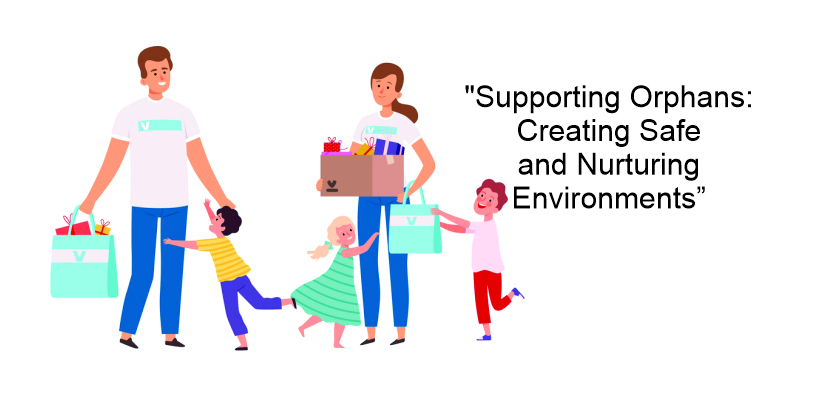Every child deserves a champion – an adult who will never give up on them, who understands the power of connection and insists they become the best they can possibly be,” said Rita Pierson, a renowned educator. This resonates profoundly with children who have lost parental care – orphans. In India, a nation with a population exceeding a billion, the number of orphans is staggeringly high. Ensuring that these vulnerable children grow up in safe, secure, and nurturing environments is paramount. While government programs and non-profit organizations such as Narayan Seva Sansthan play a crucial role in addressing this issue, there is much to be done.
Understanding the Plight of Orphans in India
A significant number of children in India have been orphaned due to various reasons – from parental deaths, and abandonment, to situations where parents are unable to provide care. These children, often thrust into the harsh realities of life at tender ages, face numerous adversities, including extreme poverty, malnutrition, illiteracy, and psychological trauma. Addressing these challenges requires concerted efforts from society, government bodies, and non-profit organizations.
The Role of Institutional Care: Orphanages and Shelter Homes
Traditionally, institutional care settings such as orphanages and shelter homes have been the primary mechanism to provide for orphans in India. These institutions offer immediate relief by providing basic necessities such as food, clothing, and shelter. However, growing evidence suggests that long-term stays in institutional care can have detrimental effects on a child’s development, underlining the need for family-based care.
Government Policies and Programs for Orphan Welfare
The Indian government has introduced several policies and programs aimed at orphan welfare. The Integrated Child Protection Scheme (ICPS) is a vital step towards creating a protective environment for children in difficult circumstances. Similarly, programs like the Sponsorship and Foster Care Program aim to provide family-based care for orphans and other vulnerable children. Yet, gaps in implementation, limited resources, and the lack of monitoring often hinder the effectiveness of these initiatives.
Non-Profit Organizations: A Beacon of Hope
Non-profit organizations are critical stakeholders in creating nurturing environments for orphans. Working at the grassroots level, they fill gaps left by government initiatives, providing care, education, and rehabilitation services to orphaned children.
The Contribution of Narayan Seva Sansthan
Among such organizations, Narayan Seva Sansthan (NSS) has made significant contributions to support orphans in India. Though primarily known for its work with differently-abled individuals, NSS also extends its care and support to orphaned children. By providing quality education, healthcare, and vocational training, NSS plays an instrumental role in ensuring these children have a chance at a brighter future.
Alternative Care Models: The Shift Towards Family-Based Care
Recognizing the limitations of institutional care, there is a global shift towards family-based care models for orphans. These include kinship care, foster care, and adoption. In India, this transition is gradually gaining momentum, but it’s not without its challenges, such as societal stigma towards adoption and a shortage of foster families.
Creating a Nurturing Environment: Strategies and Recommendations
Ensuring that orphans grow up in a safe, secure, and nurturing environment requires a multifaceted approach. Some key strategies include strengthening government policies and programs, encouraging family-based care, enhancing community involvement, and leveraging the potential of non-profit organizations.
Strengthening Government Policies and Programs
Effective policy-making and stringent implementation of child protection laws are critical to ensuring the welfare of orphans. Regular monitoring and evaluation of childcare institutions, improving the quality of care in these institutions and ensuring effective implementation of sponsorship and foster care programs are areas requiring focus.
Encouraging Family-Based Care
Family-based care, such as kinship care, foster care, and adoption, should be encouraged. Public awareness campaigns can help in breaking down the societal stigma associated with adoption and foster care. Besides, providing financial and psycho-social support to foster families can encourage more people to come forward.
Enhancing Community Involvement
Communities play a crucial role in creating nurturing environments for orphans. Community awareness programs can help in the early identification and reporting of orphaned children, preventing them from falling into the traps of child labor, trafficking, or other forms of exploitation.
Leveraging the Potential of Non-Profit Organizations
Non-profit organizations should be empowered to work in tandem with the government in providing care and support to orphaned children. Collaborative models involving government bodies, non-profit organizations, and communities can be an effective way to address this issue.
Conclusion
The journey toward creating a safe, secure, and nurturing environment for orphans in India is fraught with challenges. With combined efforts from various stakeholders, including government bodies, non-profit organizations like Narayan Seva Sansthan, and communities, it is possible to foster a future where every orphaned child in India can flourish. This journey begins with acknowledging the innate potential of these children and believing in their right to a childhood filled with love, care, and opportunities for growth.
FAQ
What challenges do orphans face in India?
Orphans in India face a host of challenges, including a lack of access to basic necessities such as adequate food, clothing, and shelter, limited access to quality education, vulnerability to physical and mental health issues, and exposure to exploitation and abuse. The long-term effects of these adversities can significantly impact their development and future prospects.
How do government policies address the welfare of orphans in India?
The Indian government has introduced several policies and programs to address orphan welfare, such as the Integrated Child Protection Scheme (ICPS) and the Sponsorship and Foster Care Program. These aim to protect children in difficult circumstances and promote family-based care.
How can non-profit organizations contribute to the welfare of orphans?
Non-profit organizations play a crucial role in supporting orphans by providing essential services such as education, healthcare, and rehabilitation. They often work at the grassroots level, effectively addressing the unique needs of local communities. Non-profits can also advocate for policy changes, raise awareness about the plight of orphans, and mobilize resources for their support.








